Open Hearts: Stories of the Surgery that Changes Children’s Lives, Kate Bull, review: ‘full of the wry humour of medicine’
This nonfiction look at heart surgery is bright, lively, and always alert to the patient’s perspective

Your support helps us to tell the story
From reproductive rights to climate change to Big Tech, The Independent is on the ground when the story is developing. Whether it's investigating the financials of Elon Musk's pro-Trump PAC or producing our latest documentary, 'The A Word', which shines a light on the American women fighting for reproductive rights, we know how important it is to parse out the facts from the messaging.
At such a critical moment in US history, we need reporters on the ground. Your donation allows us to keep sending journalists to speak to both sides of the story.
The Independent is trusted by Americans across the entire political spectrum. And unlike many other quality news outlets, we choose not to lock Americans out of our reporting and analysis with paywalls. We believe quality journalism should be available to everyone, paid for by those who can afford it.
Your support makes all the difference.Medicine is the surprise nonfiction genre of the moment. Books by distinguished practitioners Henry Marsh, Atul Gawande, Gavin Francis, and Samer Nashef have brought the culture of medicine into mainstream discourse. Kate Bull’s Open Hearts does the same for the heart surgery to correct congenital defects on babies and children that has all but banished the scourge of the blue baby.
Kate Bull has recently retired from Great Ormond Street Hospital after a lifetime’s career as a cardiologist. She tells stories of the children and the developing confidence of doctors and their techniques from the hair-raising days of the 1950s when there were no heart-lung machines and the first successful open-heart operation on a child, in Minnesota in 1954, which involved a second patient: a volunteer ex serviceman whose circulation was connected to the boy’s to keep him alive during the operation. The early technology when it arrived was often similarly improvised: Great Ormond Street used pumps from the Chivers Jam factory to cool the blood. Her many years in the profession have not dulled Kate’s wonder at the imaginative daring of it.
Kate Bull has a bright, lively style, always alert to the patient’s perspective. She doesn’t waste a word and in the many case histories that thread though the book she has a beguiling ruminative tone reminiscent of Theodore Zeldin’s An Intimate History of Humanity. She lets us in lightly and we take in a lot about the heart along the way, even, in one chapter, a detailed account of what the surgeon actually does to repair a particular heart defect.
Very few of the case histories are Kate Bull’s own patients – she wanted to meet people in a different way, without the urgency and limitations of the doctor-patient relationship. There are also stories from the time when nothing could be done for such patients: the Dutch artist Dick Ket who, before he died at the age of 36 (old for someone with his condition), painted self-portraits documenting his illness, or the Hollywood star Madhubala who also succumbed at the same age.
The book is full of the lore and wry humour of medicine. For Kate Bull, the patients and the whole medical team are the heroes. Of the surgeon as hero she writes: “Not one of these surgeons ever faced the prospect of dying on the battlefield”. She ends with a paean of praise for the internet: “If there were an award for our era’s ‘best medical innovation’, I would nominate patient support groups”. Informative, deeply humane, Open Hearts is helping to strip away the last vestiges of medical secrecy and deference.
Elliott & Thompson, £16.99
Join our commenting forum
Join thought-provoking conversations, follow other Independent readers and see their replies
Comments